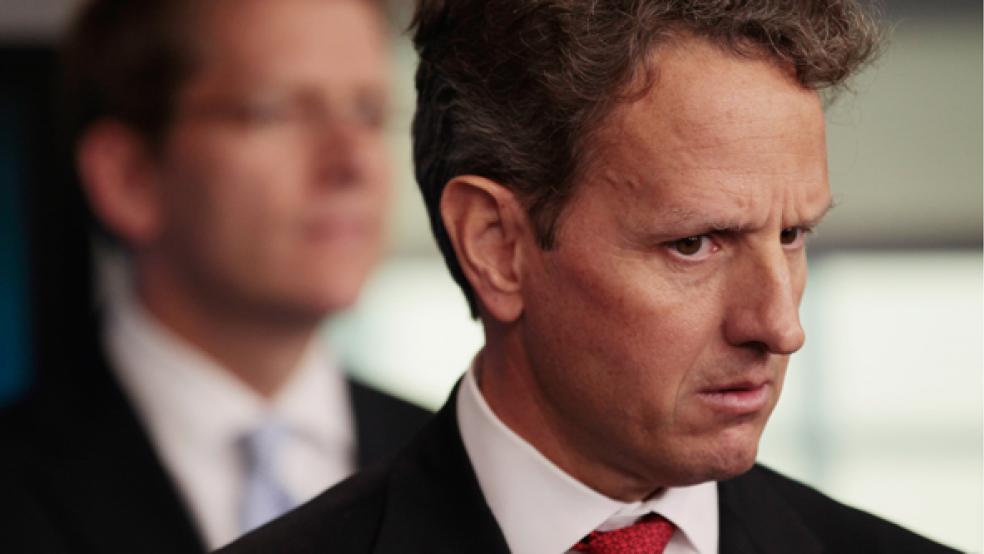In a highly cautious assessment of the likely outcome of the sovereign debt crisis, Treasury Secretary Timothy Geithner warned that without a speedy resolution the outcome could damage the entire world economy.
In an exclusive interview with The Fiscal Times, Geithner said the leaders “are going to have to move more quickly to put in place a strong firewall to help protect countries that are undertaking reforms,” and that the European Central Bank must assume a bigger role in the financial crisis than it has played until now.
Treasury officials say that erecting a “fire wall” means that European leaders must provide sufficient resources to Greece, Italy and Spain, among others, to stabilize borrowing costs and enable them to avoid defaulting on their debt while they institute budget reforms to reduce their deficits and lower the interest rates they pay on their borrowing.
There's broad agreement that the new European Financial Stability Facility created earlier this year with a lending limit of nearly $600 billion isn't funded adequately enough. Ultimately, for economic stability, the single currency and the ECB's single monetary policy will have to be matched by progress toward a fiscal union with the power to issue bonds backed by all countries in the eurozone rather than individual nations, Geithner has said.
Geithner for months has been urging European financial ministers and the central bank to move more decisively to avert a financial meltdown and international banking crisis. With strong backing from the German government, the ECB has resisted buying and guaranteeing large amounts of distressed sovereign debt. Some officials at the Treasury worry that at best, the European leaders will muddle through the latest crisis.
On Tuesday Moody’s Investors Services warned that several European countries could default on their debts or drop out of the Eurozone, which would make it extremely difficult for those countries remaining in the economic union to sell bonds. Many economists say the U.S. economy would be in jeopardy of another recession should the European banking system collapse and spread panic across the globe.
Aside from the problems in Europe, a combative Geithner said efforts to spur U.S. economic growth while gradually reining in the $15 trillion national debt have been hurt significantly by Republicans’ refusal to go along with any tax increases. He said they torpedoed the “Super Committee’s” efforts to negotiate a $1.2 trillion deficit reduction package and blocked any serious consideration of President Obama’s American Jobs Act to stimulate the economy and other measures to slow the growth of Medicare and other federal health programs. Republicans counter that the Democrats were unwilling to tackle cuts in entitlements.
“If the Congress had legislated what the president proposed on fiscal policy and on growth, the economy would be dramatically better today and better for the next three years, the next five years,” Geithner said. As for deficit reduction, Geithner said that the president provided the Super Committee with numerous specifics for how to cut the long term deficit without undercutting the slow moving economic recovery.
Geithner said that in the wake of the Super Committee’s failure, the president will “continue to put as much pressure as possible” on congressional Republicans to go along with the additional deficit cutting measures he has outlined and to pass major portions of his languishing jobs legislation. Obama is also “going to try to make the broader case to the country, as he has been doing, about the nature of the choices we face on these kinds of questions,” Geithner said. “So we are going to have this hugely consequential debate . . .about what role government should play in helping the economy, in creating a broader safety net for people, in making growth stronger, in education, and in investment incentives.”
Geithner, who was president of the New York Federal Reserve Bank before moving to the Treasury, is the sole remaining member of Obama's original economics team and his advice carries a lot of weight in the Oval Office. He had planned to resign this summer but Obama persuaded him to stay on.
Some of Geithner’s critics, particularly on the left, have complained that beginning last year, when the nation’s jobless rate was still well above 9 percent, he encouraged the president to focus on cutting spending to reduce deficits rather than seeking more fiscal stimulus to create jobs. He called that criticism “a myth.”
Geithner said he supported all three of the administration’s growth proposals that came after the initial nearly $800 billion package that passed in early 2009. But by late that year, it became clear it was going to be difficult if not impossible to win congressional approval of additional stimulus without also offering a plan for long-term fiscal reform.
“I thought that the best argument for long-term fiscal reform early was that if you’re going to need a lot more stimulus for the economy near-term, that was the only way to get it.”




